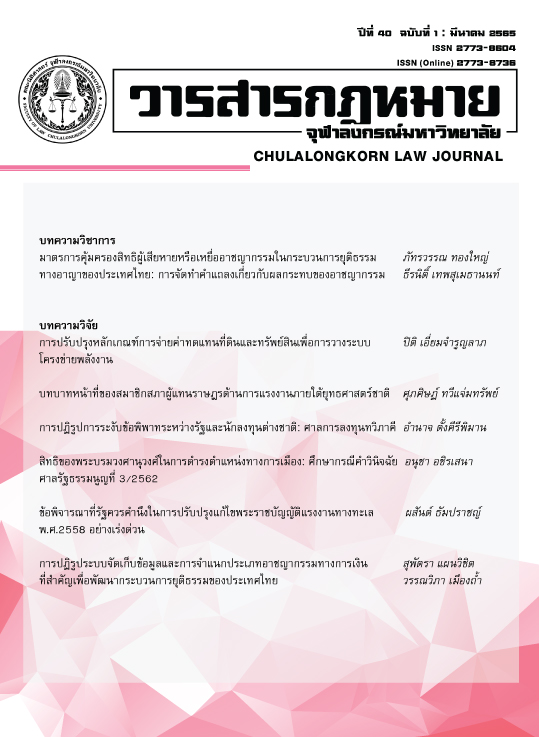มาตรการคุ้มครองสิทธิผู้เสียหายหรือเหยื่ออาชญากรรมในกระบวนการยุติธรรม ทางอาญาของประเทศไทย
Main Article Content
บทคัดย่อ
บทคัดย่อ
ภายหลังจากที่รัฐธรรมนูญแห่งราชอาณาจักไทย พุทธศักราช 2540 มีผลใช้บังคับประเทศไทยได้มีการพัฒนาและยกระดับการคุ้มครองสิทธิของผู้เสียหายหรือเหยื่ออาชญากรรมที่สอดคล้องกับมาตรฐานขององค์การสหประชาชาติอย่างต่อเนื่องและเป็นรูปธรรม อย่างไรก็ตามกฎหมายของประเทศไทยในส่วนที่เกี่ยวกับสิทธิของผู้เสียหายในการเข้าถึงความยุติธรรมและได้รับการปฏิบัติอย่างเป็นธรรม โดยเฉพาะอย่างยิ่งการมีส่วนร่วมในการดำเนินคดีอาญาและการแสดงความรู้สึกเกี่ยวกับผลกระทบของอาชญากรรมที่เกิดขึ้น ยังมีประเด็นปัญหาทางกฎหมายบางประการและไม่ครอบคลุมถึงกระบวนการในชั้นบังคับโทษ ด้วยเหตุนี้ ผู้เขียนจึงได้ศึกษากฎหมายไทยเปรียบเทียบกับกฎหมายประเทศของอังกฤษเพื่อจัดทำข้อเสนอแนะในการแก้ไขเพิ่มเติมกฎหมายที่เกี่ยวข้องในประเด็นดังต่อไปนี้ (1) ควรกำหนดให้การจัดทำคำแถลงเกี่ยวกับผลกระทบของอาชญากรรมที่เกิดขึ้นกับเหยื่อเพื่อประกอบการพิจารณาและการทำคำพิพากษาของศาล เป็นสิทธิประการหนึ่งของผู้เสียหาย โดยมีการกำหนดประเภทคดีที่ชัดเจน (2) ควรกำหนดให้ผู้เสียหายซึ่งตกเป็นเหยื่อได้เข้ามาเป็นคณะทำงานในระดับเรือนจำตามกฎกระทรวงกำหนดประโยชน์ของนักโทษเด็ดขาด และเงื่อนไขที่นักโทษเด็ดขาดซึ่งได้รับการลดวันต้องโทษ จำคุกหรือพักการลงโทษและได้รับการปล่อยตัวต้องปฏิบัติ พ.ศ. 2562 ข้อ 45 และสามารถเข้ามามีส่วนร่วมในกระบวนการพิจารณาพักการลงโทษโดยสามารถแสดงความคิดเห็นเกี่ยวกับผลกระทบที่เกิดจากอาชญากรรมต่อคณะทำงานในระดับเรือนจำเพื่อเป็นข้อมูลประกอบการพิจารณาเสนอชื่อนักโทษเด็ดขาดและการพิจารณาอนุมัติการพักการลงโทษของคณะอนุกรรมการเพื่อพิจารณาวินิจฉัยการพักการลงโทษต่อไปโดยเฉพาะอย่างยิ่งในคดีความผิดเกี่ยวกับชีวิตร่างกายที่มีลักษณะเป็นคดีอุกฉกรรจ์และคดีความผิดเกี่ยวกับเพศ
Article Details

อนุญาตภายใต้เงื่อนไข Creative Commons Attribution-NonCommercial-NoDerivatives 4.0 International License.
ลิขสิทธิ์และเนื้อหาในเว็บไซต์ของวารสารกฎหมาย (รวมถึง โดยไม่จำกัดเฉพาะ เนื้อหา รหัสคอมพิวเตอร์ งานศิลป์ ภาพถ่าย รูปภาพ ดนตรีกรรม โสตทัศนวัสดุ) เป็นกรรมสิทธิ์ของวารสารกฎหมาย และผู้ได้รับการโอนสิทธิทุกราย
1. วารสารกฎหมาย ให้อนุญาตให้คุณใช้สิทธิอันไม่เฉพาะเจาะจงที่สามารถถูกถอนเมื่อใดก็ได้ โดยไม่มีค่าใช้จ่าย ในการ
- เยี่ยมชมเว็บไซต์และเอกสารในเว็บไซต์นี้ จากคอมพิวเตอร์หรือเครื่องมือสื่อสารผ่านเว็บบราวเซอร์
- คัดลอกและจัดเก็บเว็บไซต์และเอกสารในเว็บไซต์นี้บนลงคอมพิวเตอร์ของคุณผ่านระบบความจำ cache
- สั่งพิมพ์เอกสารจากเว็บไซต์นี้สำหรับการใช้ส่วนตัวของคุณ
- ผลงานที่ได้รับการตีพิมพ์โดยวารสารกฎหมาย จุฬาลงกรณ์มหาวิทยาลัย ถูกคุ้มครองภายใต้ Creative Commons Attribution 4.0 International License ซึ่งอนุญาตให้ทุกคนสามารถคัดลอก แจกจ่าย ดัดแปลง ส่งต่อ ผลงานได้ ก็ต่อเมื่อผลงานและแหล่งข้อมูลได้รับการอ้างอิงอย่างเหมาะสม
2. วารสารกฎหมาย จุฬาลงกรณ์มหาวิทยาลัย สงวนสิทธิ์ไม่อนุญาตให้คุณใช้สิทธิอื่นใดที่เกี่ยวข้องกับเว็บไซต์และเอกสารบนเว็บไซต์นี้ เช่น การคัดลอก ดัดแปลง เปลี่ยนแปลง ส่งต่อ ตีพิมพ์ แจกจ่าย เผยแพร่ จัดแสดงในที่สาธารณะ ไม่ว่าจะในรูปแบบใดก็ตาม ซึ่งเว็บไซต์หรือเอกสารบนเว็บไซต์ โดยไม่อ้างอิงถึงแหล่งข้อมูลหรือโดยไม่ได้รับอนุญาตเป็นลายลักษณ์อักษรจากวารสารกฎหมาย จุฬาลงกรณ์มหาวิทยาลัย
3. คุณอาจขออนุญาตที่จะใช้เอกสารอันมีลิขสิทธิ์บนเว็บไซต์นี้โดยการเขียนอีเมลล์มายัง journal@law.chula.ac.th
4. วารสารกฎหมาย จุฬาลงกรณ์มหาวิทยาลัย เข้มงวดกับการคุ้มครองลิขสิทธิ์อย่างมาก หากวารสารกฎหมาย จุฬาลงกรณ์มหาวิทยาลัยพบว่าคุณได้ใช้เอกสารอันมีลิขสิทธิ์บนเว็บไซต์นี้โดยไม่ถูกต้องตามการอนุญาตให้ใช้สิทธิ ดังที่กล่าวไปข้างต้น วารสารกฎหมาย จุฬาลงกรณ์มหาวิทยาลัยอาจดำเนินคดีตามกฎหมายต่อคุณได้ เพื่อเรียกร้องค่าเสียหายที่เป็นตัวเงินและคำขอชั่วคราวให้คุณหยุดการใช้เอกสารดังกล่าว ทั้งนี้ คุณอาจถูกสั่งให้ชดใช้ค่าใช้จ่ายใดๆ ที่เกี่ยวข้องกับการดำเนินการตามกฎหมายนี้
หากคุณพบเห็นการใช้เอกสารอันมีลิขสิทธิ์ของวารสารกฎหมาย จุฬาลงกรณ์มหาวิทยาลัย ที่ขัดหรืออาจขัดต่อการอนุญาตให้ใช้สิทธิดังที่ได้กล่าวไปข้างต้น โดยเชื่อว่าได้ละเมิดลิขสิทธิ์ของคุณหรือของผู้อื่น สามารถร้องเรียนมาได้ที่ journal@law.chula.ac.th


